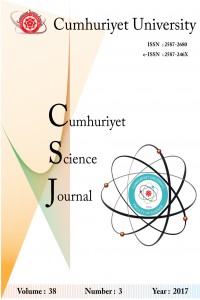Abstract
Magneto-rheological
Elastomers are smart materials whose properties can be altered reversibly and
almost instantaneously by application of external magnetic fields. Silicone
rubber species are used widely in the laboratory studies because of it is easy
to prepare and cured at room temperature.
In
this study, MRE material was produced using three different types of silicone
rubber and ferromagnetic powder which is sensitive to magnetic field. MRE
materials are obtained as isotropic (homogenous) and anisotropy (aligned)
state. Composite materials were tested in uniaxial compression testing machine
with three different test procedures. In this way, the mechanical properties
and the magneto-rheological effect of the materials were compared. As a result,
under the magnetic field to 0.430 T with anisotropic Sorta Clear40
materials were found to increase in
stress 30%, according to the pure state has been demonstrated that the rate of
50%. When the isotropic Sorta Clear40 and Vario40 materials were comparable, MR
effect was revealed that the increases the rate of about 325% at strain to 5%.
When selecting to optimum rubber types was reached the result should be used to
materials the most appropriate to the material characteristics of engineering
aspects.
References
- [1]. Rabinow, J., 1948. The Magnetic Fluid Clutch. American Institute of Electrical Engineers Transactions. 67(2): 1308-1315.
- [2]. Brei, D., Redmond, J., Wilmot, N., 2006. Hood latch assemblies utilizing active materials and methods of use. U.S. Patent A1 0012191.
- [3]. Browne, A., Johnson, N., 2006. Closure lockdown assemblies and methods of utilizing active materials. U.S. Patent B2 7.029.056.
- [4]. Lerner, A., Cunefar, K., 2005. Adaptable vibration absorber employing a magnetorheological elastomer with a variable gap length and methods and systems therefor. U.S. Patent B2 7.102.474.
- [5]. Zhou, G.Y., Li, J.R., 2003. Dynamic Behavior of a Magnetorheological Elastomer under Uniaxial Deformation: I. Experiment. Smart Materials and Structures. 12(6): 859–872.
- [6]. Zhou, G.Y., 2003. Shear properties of a magnetorheological elastomer. Smart Materials and Structures. 12: 139–146.
- [7]. Lokander, M., Stenberg, B., 2003. Improving the Magnetorheological Effect in Isotropic Magnetorheological Rubber Materials. Polymer Testing. 22(6): 677–680.
- [8]. Lokander, M., Stenberg, B., 2002. Performance of isotropic magnetorheological rubber materials. Polymer Testing. 22(3): 245-251.
- [9]. Davis, L.C., 1999. Model of magnetorheological elastomers. Journal Applied Physics. 85: 3348–3351.
- [10]. Schubert, G., Harrison, P., 2015. Large-strain behaviour of Magneto-Rheological Elastomers Tested under Uniaxial Compression and Tension, and Pure Shear Deformations. Polymer Testing. 42: 122-134.
Abstract
Manyeto-reolojik malzemeler, manyetik alan etki ettiği
durumlarda tersinir ve hızlı bir şekilde kontrol edilen malzemeler türündendir.
Silikon kauçuk türleri, hazırlanması kolay ve oda sıcaklığında vulkanize
olduğundan dolayı laboratuar ortamındaki çalışmalarda yaygın bir şekilde
kullanılmaktadır.
Çalışmada, Üç farklı silikon kauçuk türü ve manyetik
alana duyarlı ferromanyetik toz kullanılarak MRE malzemeler üretilmiştir. MRE
malzemeler, izotrop(homojen) ve anizotrop(hizalanmış) durumda elde edilmiştir.
Elde edilen kompozit malzemeler tek eksenli basma test cihazında üç farklı test
prosedürüne tabi tutularak test edilmiştir. Bu şekilde malzemelerin mekanik
özellikleri ve manyeto-reolojik etkilerinin kıyaslanması amaçlanmıştır. Sonuç
olarak anizotropik Sorta Clear40 malzemesi ile yapılan testlerde 0.430 T
manyetik alan altında % 30 gerilme artışı varken, saf duruma göre ise bu oran %
50 olarak ortaya konmuştur. Aynı zamanda izotropik Sorta Clear40 ile Vario40
malzemesinin kıyası neticesinde % 5 şekil değişiminde yaklaşık % 325 oranında
MR etki artışı olduğu ortaya konmuştur. Kauçuk türleri seçilirken mühendislik
açıdan malzeme karakteristiğine en uygun olanlarının kullanılması gerektiği
sonucuna varılmıştır.
References
- [1]. Rabinow, J., 1948. The Magnetic Fluid Clutch. American Institute of Electrical Engineers Transactions. 67(2): 1308-1315.
- [2]. Brei, D., Redmond, J., Wilmot, N., 2006. Hood latch assemblies utilizing active materials and methods of use. U.S. Patent A1 0012191.
- [3]. Browne, A., Johnson, N., 2006. Closure lockdown assemblies and methods of utilizing active materials. U.S. Patent B2 7.029.056.
- [4]. Lerner, A., Cunefar, K., 2005. Adaptable vibration absorber employing a magnetorheological elastomer with a variable gap length and methods and systems therefor. U.S. Patent B2 7.102.474.
- [5]. Zhou, G.Y., Li, J.R., 2003. Dynamic Behavior of a Magnetorheological Elastomer under Uniaxial Deformation: I. Experiment. Smart Materials and Structures. 12(6): 859–872.
- [6]. Zhou, G.Y., 2003. Shear properties of a magnetorheological elastomer. Smart Materials and Structures. 12: 139–146.
- [7]. Lokander, M., Stenberg, B., 2003. Improving the Magnetorheological Effect in Isotropic Magnetorheological Rubber Materials. Polymer Testing. 22(6): 677–680.
- [8]. Lokander, M., Stenberg, B., 2002. Performance of isotropic magnetorheological rubber materials. Polymer Testing. 22(3): 245-251.
- [9]. Davis, L.C., 1999. Model of magnetorheological elastomers. Journal Applied Physics. 85: 3348–3351.
- [10]. Schubert, G., Harrison, P., 2015. Large-strain behaviour of Magneto-Rheological Elastomers Tested under Uniaxial Compression and Tension, and Pure Shear Deformations. Polymer Testing. 42: 122-134.
Details
| Journal Section | Articles |
|---|---|
| Authors | |
| Publication Date | September 30, 2017 |
| Submission Date | May 15, 2017 |
| Acceptance Date | June 5, 2017 |
| Published in Issue | Year 2017Volume: 38 Issue: 3 |


